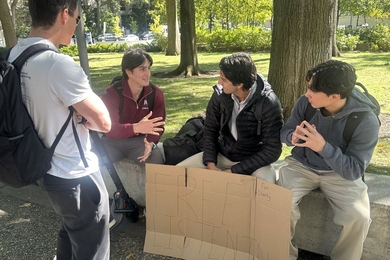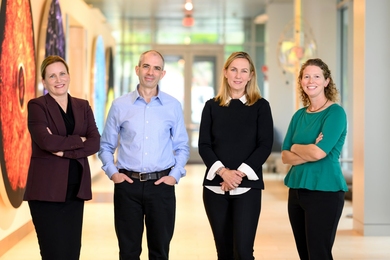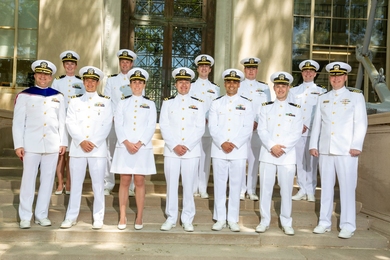Approximately 1,500 economic, business, and social historians are gathering at MIT this week to discuss globalization, inequality, economic growth, and the changing role of technology. They are convening from around the world for the International Economic History Association's 18th World Economic History Congress — the first to be held in North America in the 50 years since 1968.
The event features talks from leading thinkers, including Thomas Piketty, author of the best-selling "Capital in the Twenty-First Century," who taught in the MIT Department of Economics from 1993 to 1995 and has returned to MIT as a visiting professor; Harvard University economist Claudia Goldin, author of "Understanding the Gender Gap: An Economic History of American Women;" Oxford University historian Jane Humphries, author of "Childhood and Child Labour in the British Industrial Revolution;" and MIT’s own Peter Temin, author of "The Vanishing Middle Class: Prejudice and Power in a Dual Economy."
MIT professor of history Anne McCants, who was instrumental in bringing the conference to MIT, is the current vice president of the International Economic History Association (IEHA), the chair of this year's congress, and will serve as the next president of the IEHA. She recently shared her perspectives on the 2018 gathering with the communications team in the Dean's Office of MIT's School of Humanities, Arts, and Social Sciences.
Q. Why is this conference a significant event for MIT?
A. The congress highlights the Institute’s commitment to the principles of international scholarly cooperation and open intellectual exchange. It also gives MIT the opportunity to highlight for the world the quality of its social science and humanistic research programs, as well as its commitment to the incorporation of the human sciences into its engineering and natural sciences curriculum.
Q. The 2018 conference topic is “Waves of Globalization.” Can you share why the research of economic historians is so important to understanding the impact of globalization on different institutions and regions?
A. When the theme of this year’s meeting was selected almost four years ago, globalization was the topic on everyone’s mind. Largely, the mood was celebratory. Economic historians then were asking: When did globalization begin and where? In general, they were not asking not whether globalization represented progress; that was largely taken to be true.
Everyone recognized that large-scale change is disruptive and can bring uneven benefits, but the basic assumption was that greater global integration of factor markets, consumer markets, financial markets, and the marketplace of ideas would bring enough prosperity overall that the bumps could be evened out by local political fixes.
So far, that has not proved to be the case. While the wealth effects of globalization have been real enough, the local distributional fixes seem to have been very uneven in their effectiveness. As a result, the political world looks very different today than it did just a few years ago, even if the fundamentals of the international economy have not changed much.
This strikes me as exactly the moment when the work of economic historians is of greatest importance. We have something useful to say about what the disruptions of previous “waves of globalization” have looked like and how social and political communities have resolved the disruptions of those episodes. Many of those resolutions were violent, but not all. So, there are important lessons for us to learn from those episodes, and opportunities to thoughtfully attempt to do better — especially if we take as a goal minimizing violence and human suffering.
First, however, we have to understand that this is not the first time that the forces of interconnection have altered people’s way of life in one place or another; far from it. The work of economic historians is valuable because they theorize about why events unfold as they do and speculate on how they might do so again in the future. But, significantly, economic historians also uncover the events themselves, often identifying totally unexpected phenomena in the many kinds of archives left by the past, be they written, material, artistic, biological, or even geologic.
If we don’t know what happened in the past, we are hard-pressed to understand usefully what we see in the present. Everything appears perpetually new, surprising, and often deeply unsettling. The consequences of taking such a blind path forward are rarely felicitous.
Q. What kinds of useful insights might this conference provide for addressing today’s top challenges?
A. From my survey of the agenda, I think the big topics are likely to be the costs and benefits of global interactions of all kinds; the pressing need for further development of nations that are home to the so-called “bottom billion” (the world’s poorest billion people); the sources of inequality in outcomes as well as opportunities; and the connections between political processes and the economy. These are, of course, also the most pressing issues of our time. So, the research presented at the congress will speak in the most direct way possible to the questions the whole world is asking at this moment. My great hope is that we can communicate the results of that research in a way that the world can hear.
Q. In what ways will the conference highlight new research techniques and the ways technology is changing the field of economic history? Any examples of exciting new work that will be unveiled?
A. The most evident way that new research techniques will be unveiled at the congress will be in the projects that rely on the various big data sources that have been in development in economics and also history over the past several years. The digitization of an increasing number of archives, and the application of data-mining tools, have opened up whole new avenues of investigation that were simply not possible before.
It will be interesting to see what kinds of surprises they will bring, and whether those surprises prove to upend well-established narratives about the past, or theories about how that past evolved. I’m excited by the possibilities here, but I also think the jury is still out.
Data-mining techniques can allow us to see patterns invisible to the naked-eye as it were; but they might also tempt us to look for answers only in the places where the data exist to be mined at all — leading us like the proverbial drunk to look for our keys under the streetlight rather than where they were actually dropped.









